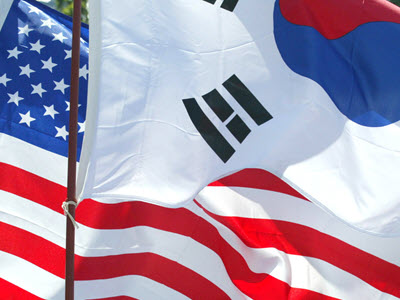A New Clean Energy Supply Chain and the Role of South Korea
Sung Jun Park argues that South Korea is a suitable partner for the United States to develop an alternative clean energy supply chain. He notes that this would also be good for South Korea’s economy, giving the country a strong incentive to participate in U.S.-led multilateral cooperation and make significant investments. This essay is part of the roundtable “U.S.-ROK Cooperation on Energy and Critical Minerals Supply Chains.”
The transition toward a green economy has become a global priority in the battle against climate change. Simultaneously, major economies perceive the green transition as a new growth strategy. The European Union, a frontrunner in this effort, has articulated this very point in various statements. The Inflation Reduction Act (IRA), a landmark climate legislation under the Biden administration, has also prominently reflected this perspective. China has been swift to move, emerging as a dominant player in the renewable energy sector. The green transition is thus intricately tied to industrial policies, with major players striving to lead and secure resources.
Robust, resilient, and sustainable supply chains are pivotal to the clean energy transition. However, the world is heavily reliant on China for critical minerals, especially processed or refined ones, as well as for key components and products. Consider the supply chain for electric vehicles (EVs). China is a predominant supplier of lithium, cobalt, nickel, manganese, and graphite. Its global market share for EV batteries exceeds 50%, partly due to its dominance in processing critical minerals. For solar panels, China stands out as a top supplier of solar-grade polysilicon, a crucial material for solar photovoltaic cells, with a market share of more than 80%. China also dominates other key components such as silicon ingots, wafers, and solar cells, with its global market share for solar panels rapidly growing to around 80% over the last decade.
With rising geopolitical tension between the United States and China, there is growing concern among like-minded countries about China’s near-monopoly power in the clean energy supply chain. However, this does not necessarily imply that the United States and like-minded countries should “decouple” from China. Such a move is neither likely nor desirable. Current mining and processing capacities outside China fall significantly short of what is required for the clean energy transition. Moreover, developing a mine takes several years, if not more than a decade. Furthermore, extracting and processing critical minerals typically results in severe environmental damage, and thus plans to build such facilities face severe opposition from local communities and environmental activists, making it hard to expand capacity in the short term.
That being said, the world requires an alternative clean energy supply chain for several reasons. First, the geographic concentration of a supply chain is always undesirable, even without geopolitical rivalry between the United States and China. Additionally, the clean energy supply chain should be more ecofriendly. Currently, the extraction and processing stages often inflict severe damage on the environment. Lastly, the supply chain should be more inclusive, offering tangible benefits to participating nations. Many resource-abundant countries aspire to develop their economies by participating in the clean energy supply chain.
Why is South Korea a suitable partner for the United States in addressing this challenge? First, both countries share mutual interests in building a robust clean energy supply chain. The United States requires reliable manufacturers outside China for the clean energy transition, and Korean firms are eager to explore new opportunities abroad. Korean EV battery and solar panel manufacturers are already expanding their operations in the United States following the passage of the IRA. In fact, Korean EV battery makers are a crucial part of the EV industry in the United States.
Moreover, developing a critical minerals supply chain is essential for South Korea’s economy, giving the country a strong incentive to participate in U.S.-led multilateral cooperation and make significant investments. South Korea is already a member of the Mineral Security Partnership, which is a U.S.-led effort to build a robust, resilient, and sustainable clean energy supply chain.
Lastly, South Korea can contribute to making the clean energy supply chain more environmentally friendly. While the United States has long been recognized as a global leader in innovation and technology, South Korea has an impressive track record of innovation, ranking second only to Israel in terms of R&D expenditure as a share of GDP and fourth in international patent applications. This presents abundant opportunities for cooperation in green technology. As discussed earlier, the current processes of extracting and refining critical minerals damage the environment and require improvement. The development of technology to enhance the recycling of critical minerals is also crucial. Innovation at the product level is another vital area, where more resource-efficient batteries or solar panels, ones that depend less on scarce minerals, would be good examples.
Clean energy cooperation between the United States and South Korea would be mutually beneficial. To further strengthen cooperation, the two countries need to align their long-term visions. Regular meetings between policymakers from both countries would be constructive for coordinating their interests regarding the clean energy transition.
In particular, South Korean companies should be encouraged to increase clean energy–related investment both at home and in the United States by reducing the uncertainty that these companies face. Another excellent way to strengthen cooperation in the clean energy sector is by fostering joint projects. A notable example of such collaboration can be seen in the current joint ventures between automakers in the United States and Korean battery firms. These efforts could also include activities such as the exploration of critical minerals, the development of mines, and the construction of smelting facilities that adhere to the environmental, social, and governance standards set by the Mineral Security Partnership. Successful projects will not only generate significant economic benefits but also cultivate mutual trust among stakeholders, which is a prerequisite for long-term cooperation.
Sung Jun Park is an Associate Research Fellow at the National Assembly Futures Institute in Seoul.


